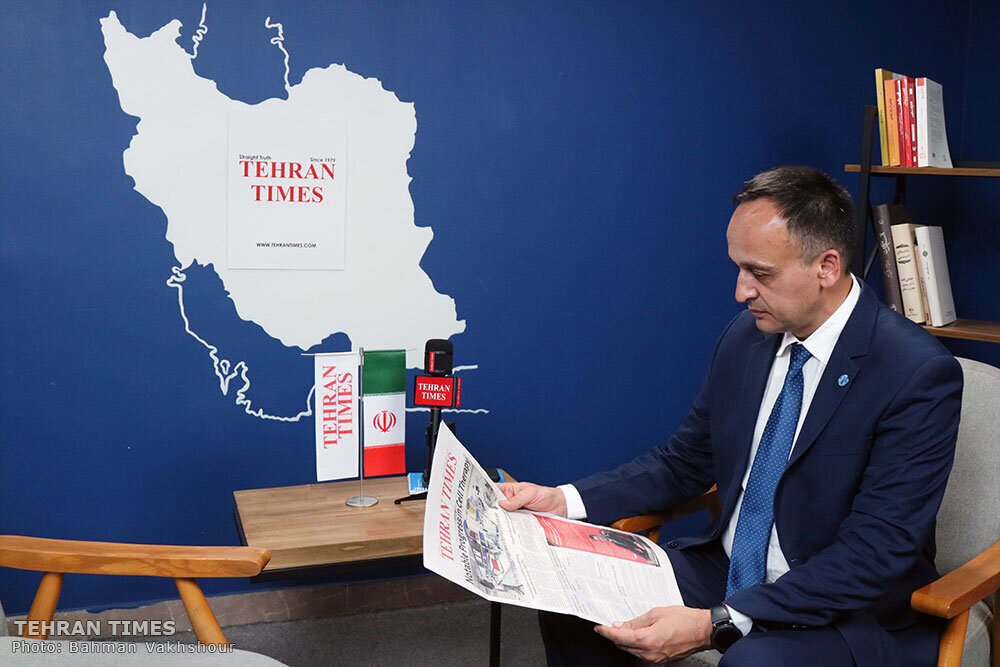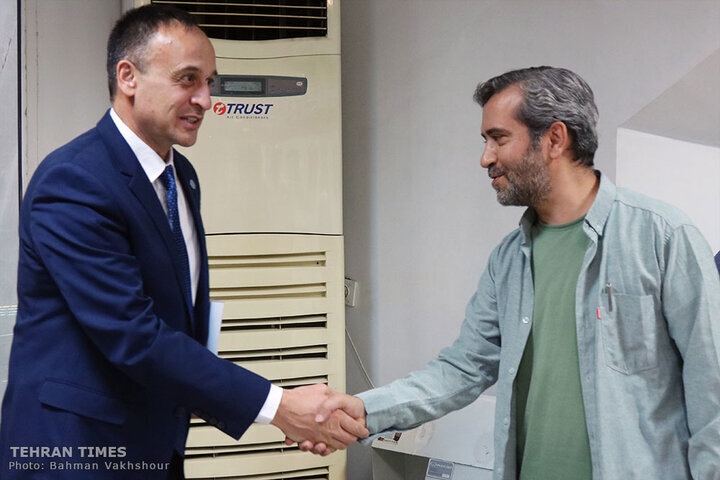Research and achievements in Iran’s agriculture sector are significant: FAO representative

TEHRAN - Farrukh Toirov, the representative of the Food and Agriculture Organization of the United Nations (FAO) to Iran, says the significant achievements of Iranian scientists are important to be delivered to other countries that do not have the same level of technological advancements in the agriculture sector.
A national of Tajikistan, Mr. Toirov brings over 20 years of experience in international development and agricultural programming to his role as FAO representative to the Islamic Republic of Iran.
In an exclusive interview with the Tehran Times on Monday, August 11, Toirov also said FAO’s priority is to make sure that the functioning of food systems is improved, not only for the betterment of people in Iran, but also for the benefit of other countries in the region.
Hereunder is the full text of the interview.
Could you please briefly introduce FAO’s mandate globally and specifically in Iran?
FAO's mandate is to eradicate poverty and improve food security all over the world for the entire population. Here, the challenges that human civilization is facing are unfortunately still quite big.

A significant number — at times it was nearly a billion people — now, with some improvements, is about 800 million people in the world who still remain food insecure. And that is at a time where we have technologies for sending people into space, but at the same time, not everybody in the world is, unfortunately, food secure and able to have enough food for their daily consumption.
This situation is being further aggravated by the unfortunate impacts of climate and climate change, where the production of agricultural land is reducing and where the food systems for different key agricultural commodities are being disrupted.
A significant number of people, especially in developing countries where the level of economic activities is not sufficient for them to be better integrated with the world economies to procure food from international markets, have seen their situation deteriorate.
What are FAO's current priority areas of cooperation with Iran?
In Iran, we see a number of areas of importance for FAO to work on. The level and type of agro-climatic conditions here are favorable for different types of important food commodities, starting from high-value crops, but also going down to grains and the food commodities of the staple crops, which the population needs here in Iran.
Iran is producing the type of food commodities that are important for the food security of not only its own population but also the countries in the region with which Iran has a very tight interconnectedness in the food systems.
Today, in the 21st century, the interrelationships and interconnectedness of countries in terms of food production, logistics, and then delivery and consumption to the population are much more complex than they were before. Countries are much more interlinked.
Iran's geographic location and level of development make it very well and uniquely positioned. Iran's food systems are interlinked with several countries in the region, and therefore, the type of work that FAO prioritizes in Iran is to make sure that the functioning of these food systems is improved for the betterment of the people of Iran, but also for the benefit of other countries in the region.
We see that in Iran, the level of research and achievements in the agriculture sector is also significant, and therefore, these achievements of Iranian scientists are important to be delivered to a few other countries that do not, unfortunately, have the same level of technological advancements in the agriculture sector.
Can you tell us more about FAO’s climate finance project in Iran, particularly the work with the Green Climate Fund?
This is a very important area that FAO works on in the context of Iran, whereby climate change is unfortunately affecting the agriculture sector of the country. At the same time, Iran's agricultural research potential is picking up, and the researchers of the country are coming up with technologies to address the impact of climate change in the agriculture sector.

Similarly, FAO has expertise because it is working on climate change aspects and adapting to the realities of the new times based on the change in climate patterns. FAO has expertise to offer, and we are bringing from FAO’s side experts who have international experience in other countries and who have worked on climate change impacts in agriculture in Iran, so that the farmers, researchers, and specialists of Iran can learn from FAO’s international expertise.
Climate change is a phenomenon that has a very severe impact on the agriculture sector. For example, the change in precipitation patterns is already making a big impact on the agriculture sector because, when crops are planted, they need a certain pattern of rainfall to make sure that they are irrigated on time.
Even if the overall amount of rain in the year is sufficient, if it does not come at the specific times required, it will not help the growth pattern of the plants. Therefore, any change in rainfall patterns, temperature patterns, or seasonality has a major impact on the agriculture sector, and the sector needs to adapt to these new realities.
From FAO's side, we are implementing projects with the Green Climate Fund to come up with adaptation plans: what needs to be done in a country like Iran, what kind of strategic priorities need to be identified, and what kinds of adjustments need to be made in the different sub-sectors of agriculture in the country to ensure that production matches the new realities created by climate change.
Iran is among the water-stressed countries in the world. What practical steps can FAO take to address water scarcity? Is FAO focusing on any specific projects to replace water-intensive crops with drought-resistant crops in the country?
Exactly. This question fits very well with what we just discussed. Indeed, since the pattern of precipitation is changing because of climate change, some years we have more rain, some other years less, or we have more rain during the spring season, then now during the autumn season, or maybe in winter. This change in patterns is creating difficulties for the agriculture sector.
Science and technology are the solutions to such changes in reality. That is why the practices that farmers had from previous generations are unfortunately not effective anymore. Therefore, scientific research is important to develop seed varieties that are more drought resistant, with shorter maturity periods, and with different water and irrigation requirements, because some plant varieties have high water requirements, but through research and improvement, this dependence on intense irrigation can be reduced.
From FAO’s side, our experts are working in this area to identify the types of seeds and crop varieties that are favorable in the different agro-climatic conditions, including here in Iran. We are working closely with Iranian scientists and researchers, who have already progressed well in this area, and we are also bringing in international expertise and knowledge from other countries where FAO has worked, which could be beneficial for scientists and farmers here.
The current shortage of water, as is occurring this year, is a significant issue. Therefore, the need for such FAO projects is further increasing, because this year already demonstrates that there could be years when the pattern of rainfall changes, and there may not be a sufficient amount of rain or snow. In those times, the type of seeds and the water-conserving practices that farmers apply will be essential.
In our FAO projects, we bring such knowledge to the country and also help farmers and the government develop strategies for using advanced irrigation technologies that save water and ensure that every drop of water produces the maximum agricultural yield.
In what ways can the private sector be more involved in sustainable agriculture and security in Iran?
It is a very interesting question, and there are a lot of debates in this area. My view is that the private sector has a very, very important role.
In this equation, there are not many players. There is the government, which makes policies and strategies — what should be done, how the country should plan its strategic priorities, which crops to cultivate in which area, etc. There are international organizations like FAO, which can come and provide best practices from other countries and knowledge-based solutions. There are farmers who actually practice agriculture in their daily lives and whose livelihoods depend entirely on it.

And then there is the private sector, which plays a very significant role in connecting all these dots. Farmers produce agricultural commodities, but they are also part of private sector networks — because the food from their fields needs to be harvested, sorted, graded, packed, transported, stored, labeled, and taken either to processing factories or retail shops for final consumers.
This entire chain — from the first point of production until consumption — is in the hands of the private sector. Even before that, when farmers need to buy farming inputs like seeds, fertilizers, and machinery, they purchase them from the private sector. It is the private sector’s job to supply these materials to farmers at affordable prices.
Therefore, in this whole equation, the role of the private sector is really big and cannot be underestimated. In all our programs, FAO engages the private sector alongside the government and research institutions to sit together and come up with solutions that benefit everyone.
In Iran, the private sector is already doing good and important work. Especially in projects related to the export of high-value agricultural commodities like pistachios and saffron, their role is crucial. From FAO’s side, we do everything possible to create an enabling environment and to help the government do the same so that private companies can operate more easily. Their growth directly contributes to the growth of the agriculture sector and, in turn, to the economy of the country.
Leave a Comment